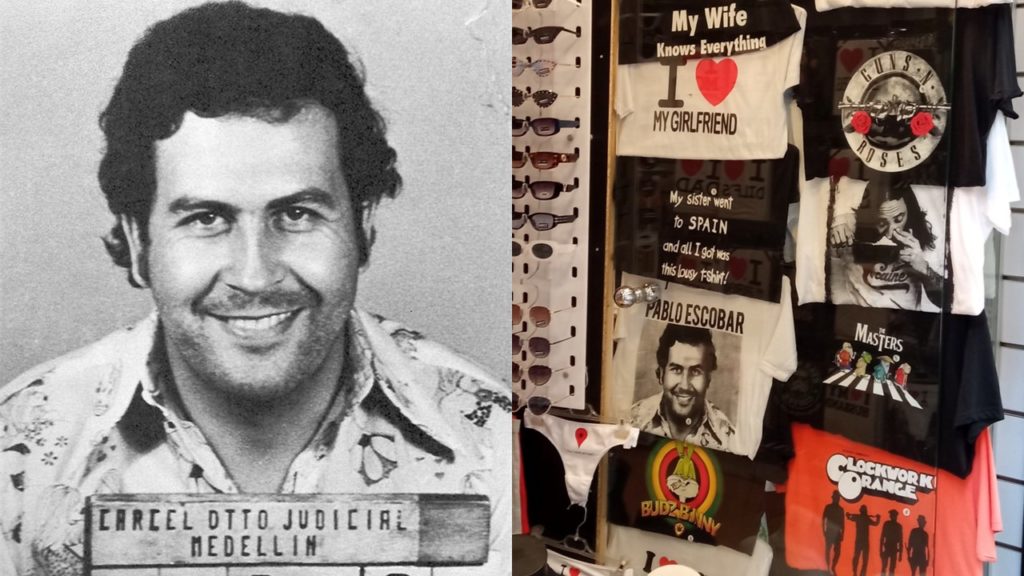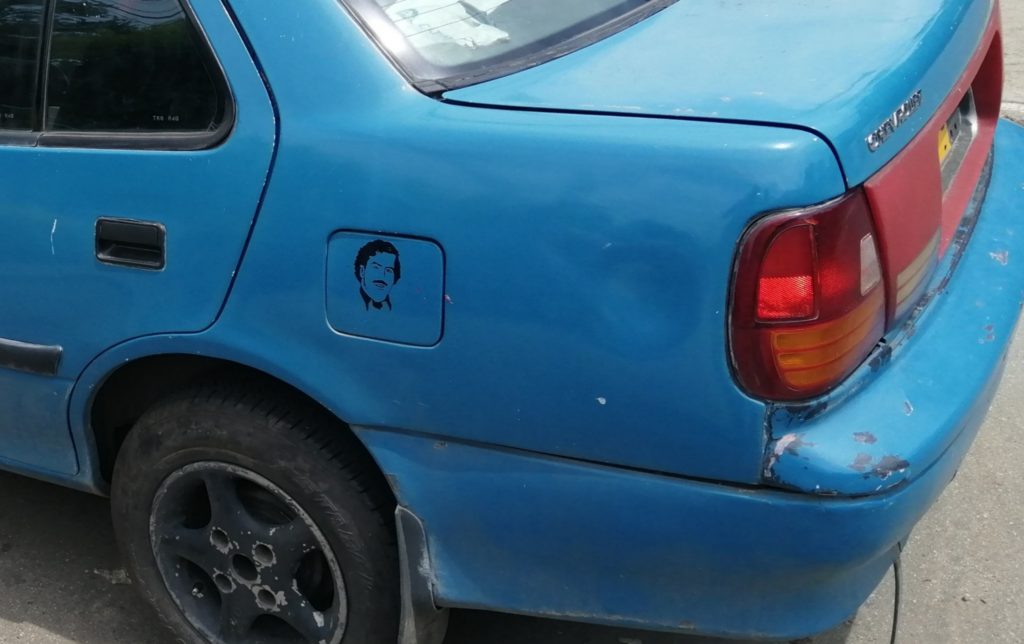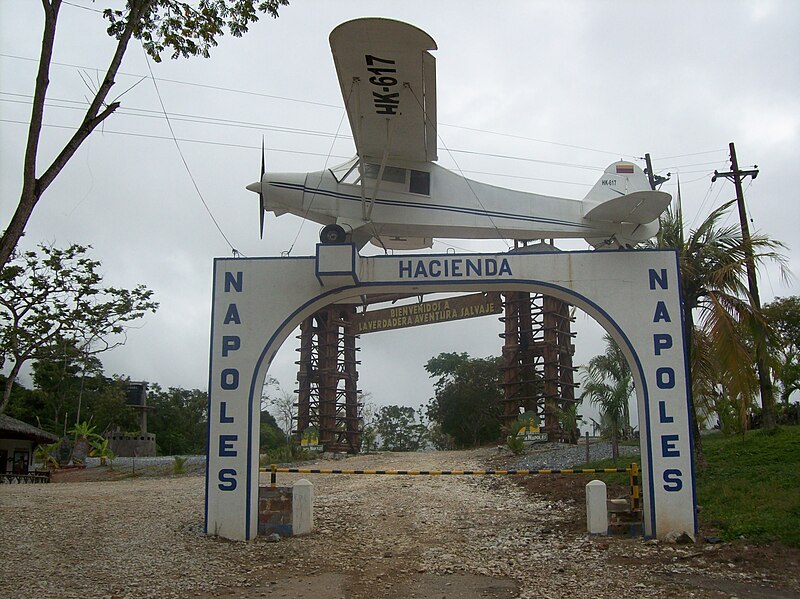
Pablo Escobar’s legacy remains alive 30 years after his death. On a day like today in 1993, an elite squadron of the Colombian police riddled the most famous cocaine boss in Colombia with bullets, a figure that, even now, three decades later, still casts a shadow over the country as a false hero turned villain—a man who created a way of life that has prospered: rapid, easy enrichment at any cost.
Colombia hasn’t managed to shake off this history of pain and death, of exponential violence that pushed society to the brink of destruction in the 1980s and 1990s. The criminal’s legacy still weighs heavily today, especially in popular sectors, mainly in his native Medellin, where many believe “the boss” is still alive, hidden somewhere in the city. There are still those who admire the boss who corrupted society and altered its values.
Escobar is remembered and portrayed in countless series and movies, many produced and consumed locally, which help perpetuate negative stereotypes of Colombian society abroad. He deified the figure of the hitman, often mere children aspiring to a life of quick luxuries, surrounded by scandalous opulence and prostitution.
The False Hero of the Working Classes
Pablo Escobar was born in Río Negro, on the outskirts of Medellin, in 1949. Born to a farmer and a teacher, he quickly displayed business acumen. He began his criminal activities by stealing marble tombstones from cemeteries but in the 60’s graduated to small-time drug trafficking for the booming export market. One drug would make him a millionaire and a dangerous man: cocaine.
This chemical transformation of the ancient coca leaf ruined the lives of millions of Colombians and, to this day, remains one of the sadly exported illegal products of the country. By the late ’70s, Escobar was immensely wealthy. However, once his pockets were filled with drug money, he wanted to taste power. He ventured into politics, and that’s when the State, which had previously turned a blind eye when cocaine began to circulate in the national economy, began to worry.
The criminal who organized and led the Medellin Cartel established values and methods that permeated a country eager to prosper at any cost, forsaking principles and the very essence of societal ethics.

The State Allowed the Monster to Grow
When the Colombian State wanted to confront the boss, the monster was already too powerful to surrender easily. For a decade, Escobar didn’t just evade laws; he manipulated Colombian institutions, politicians, businessmen, judges, and journalists. He turned an entire generation of Antioquian children and young people into hitmen who died before reaching 30.
It was precisely this corrupt, clientelistic, and exclusive State that allowed the beast to grow until eventually turning against it and daring to challenge it. It was during President Gaviria’s tenure that security forces decided to face the boss, but the price paid for his annihilation was very high.
Pablo Escobar the man died 30 years ago today, riddled with bullets on a rooftop in a house in Medellin. However, the terror he left behind still lingers among those who haven’t managed to rise above poverty-stricken circumstances in a State that leaves little room for them to prosper.
Ambition Killed Pablo Escobar
Many in Colombia believe conspiracy theories stating the drug lord didn’t die, that it was a police setup woven from yet another pact between the State and the criminal. Indeed, some think Escobar lives in retirement, enjoying his fortune; in this case he would now be aged 74.
It’s just a national episode of the universal conspiracy theory. Escobar died, still young, due to his boundless ambition. Because no one doubts that if the drug lord hadn’t dared to challenge the State and declare an all-out war, he might still be among us, likely admired and enjoying the benefits of his extreme wealth.
However, extravagance became his way of life; he epitomized the ‘nouveau riche’ who needs to flaunt his vulgar wealth to the point of scandalizing. His oversized estate, the zoo with hippos he organized on it, and even the underage prostitutes he abused were, for many, reasons for admiration.

44 Years and 1 Day
However, like so many men in history, Escobar was defeated by ambition. Born into a humble family of “nobodies,” as Eduardo Galeano would say, he didn’t settle for amassing an enormous fortune in record time. Escobar wanted more; he wanted to feel powerful, and that obsession, which led to madness, became his death sentence.
Not even when he lived confined in the jail/palace he constructed did he understand it was better to stop than to continue mocking the State. But the boss couldn’t stop. Like someone walking steadily towards death, without trying to resist, Escobar followed the fate of many young people whom he initiated into corruption and who ended up dying young, after living life too fast.
His family were his Achilles’ heel, and the tool the State used unscrupulously to physically destroy him. Located by the search bloc thanks to an ill-timed and fatal phone call to his son, the boss was shot down aged 44 years and 1 day, which, although it sounds like a criminal sentence, was the time that the man Escobar lived on earth, just before perpetuating the false myth.
The Gains of Evil
Beyond television fiction, merchandise in memory of the drug trafficker continues to generate money in Colombia and beyond. Even before the Netflix series, T-shirts with Pablo Escobar’s face were sold all over the world, not as a reminder of the criminal but as an icon of amoral and degenerate values that garner so many followers globally.
During the Christmas season a few years ago, when Netflix displayed a giant banner featuring Escobar from its famous fiction series in a central square in Madrid (Spain) with the slogan “white Christmas,” the Colombian embassy protested. Diplomacy complained about the negative image and stereotypes the commercial image projected onto an entire country. Perhaps it’s true; nevertheless, it’s curious that most famous TV series produced by Colombian television continue to perpetuate in the national collective imagination male characters inspired by Escobar’s values and ways, with hypersexualized women who prostitute themselves willingly in exchange for social and economic advancement.
And precisely that, thirty years on, continues to define a society that hasn’t managed to free itself from the moral evil of the Escobar myth and character, in itself a more destructive force than the man who dared to challenge an entire country during the worst period of violence in Colombia’s history.
See all the latest news from Colombia and the world at ColombiaOne.com. Contact our newsroom to report an update or send your story, photos and videos. Follow Colombia One on Google News, Facebook, Instagram, and subscribe here to our newsletter.

